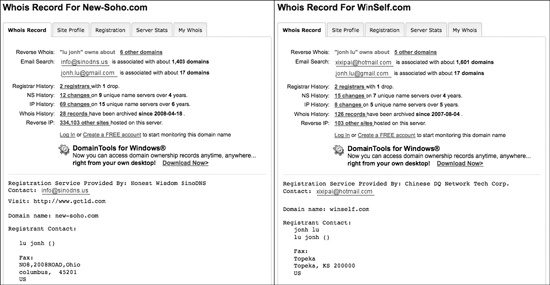into IP addresses (and back). Unsurprisingly, malware also uses DNS to look like regular traffic, and to maintain flexibility and robustness when hosting its malicious activities.
shows the types of information available about DNS domains and IP addresses. When a domain name is registered, registration information such as the domain, its name servers, relevant dates, and contact information for the entity who registered the name is stored in a domain registrar. Internet addresses have registries called Regional Internet Registries (RIRs), which store IP address blocks, the blocks’ organization assignment, and various types of contact information. DNS information represents the mapping between a domain name and an IP address. Additionally, metadata is available, including blacklists (which can apply to IP addresses or domain names) and geographical information (which applies only to IP addresses).
Three lookup sites deserve special mention:
DomainTools ()
Provides historical whois records, reverse IP lookups showing all the domains that resolve to a particular IP address, and reverse whois, allowing whois record lookups based on contact information metadata. Some of the services provided by DomainTools require membership, and some also require payment.
)
Provides information about multiple domain names that point to a single IP address and integrates a wealth of other information, such as whether a domain or IP address is on one of several blacklists.
BFK DNS logger ()
Uses passive DNS monitoring information. This is one of the few freely available resources that does this type of monitoring. There are several other passive DNS sources that require a fee or are limited to professional security researchers.


